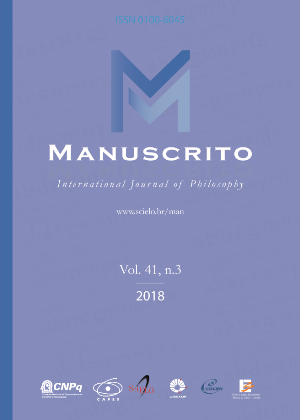Resumen
Una condición usualmente considerada necesaria para el autoengaño consiste en que la creencia que se adquiere o mantiene no debe ser sostenida por la evidencia a disposición del agente. Sin embargo, esta formulación general de la condición es demasiado amplia y requiere de mayor precisión. En el presente artículo se presenta una caracterización de tal condición que intenta superar las objeciones que pueden elevarse contra las formulaciones existentes.Citas
AUDI, R. “Self-Deception, Action, and Will”. Erkenntnis 18, pp. 133–58, 1982.
AUDI, R. “Self-deception vs. self-caused deception: A comment on Professor Mele”. Behavioral and Brain Sciences 20 (1), p. 104, 1997.
BACH, K. “An Analysis of Self-Deception”, Philosophy and Phenomenological Research, 41, 3, pp. 351-370, 1981.
BARNES, A. Seeing through self-deception, New York: Cambridge University Press, 1997.
BARON, M. “What is Wrong with Self-Deception?”, en Brian McLaughlin & Amelie Oksenberg-Rorty (eds.), 1988.
BERMÚDEZ, J. L. “Self-deception, intentions and contradictory beliefs”, Analysis 60, 4, pp. 309-19, 2000.
BORGE, S. “The Myth of Self-Deception”, The Southern Journal of Philosophy. 41, 1, pp. 1–28, 2003.
BUTLER, J. (1726): Sermon X. Upon Self-Deceit. Extraído el 24/07/2010 de http://anglicanhistory.org/butler/rolls/10.html
CORREIA, V. “Sour Illusions. What is adaptive about misbelief”. Extraído el 17/7/2012 de http://fcshunl.academia.edu/VascoCorreia/Papers/581527/Sour_illusions_What_is_adaptive_about_illusional_beliefs
DAVIDSON, D. “Engaño y división”, en D. Davidson, Mente, mundo y acción. Barcelona, Paidós, 1985.
DEMOS, R. “Lying to Oneself”, Journal of Philosophy, 57, pp. 588–95, 1960.
DEWEESE-BOYD, I. “Collective self-deception, collective injustice: Consumption, sustainability and responsibility”. Extraído el 27/10/10 de http://www.colorado.edu/philosophy/center/rome/papers/DeWeeseboyd_CollectiveSelfDeception_CollectiveInjustice.pdf
DEWEESE-BOYD, I. “Self-Deception”. The Stanford Encyclopedia of Philosophy. Edward N. Zalta (ed.). Extraído el 22/2/2017 de https://plato.stanford.edu/archives/win2016/entrie s/self-deception
FINGARETTE, H. Self-deception, London: Routledge & Kegan Paul, 1969.
HIRSTEIN, W. Brain Fiction. Self-Deception and the Riddle of Confabulation, Cambridge: The MIT Press, 2005.
HOLTON, R. “What is the Role of the Self in SelfDeception?”, Proceedings of the Aristotelian Society, 101, pp. 53-69, 2000.
LAZAR, A. “Deceiving Oneself or Self-Deceived? On the Formation of Beliefs ‘Under the Influence’”, Mind 108, 430, pp. 265-290, 1999.
LEVY, N. “Self -Deception and Moral Responsibility”, Ratio (new series), XVII, pp. 294-311, 2004.
LYNCH, K. “Self-Deception, Religious Belief, and the False Belief Condition”, The Heythrop Journal, LI, pp. 1073– 1074, 2010.
MELE, A. Irrationality. An Essay on Akrasia, Self-Deception, and Self-Control, New York-Oxford: Oxford University Press, 2010.
MELE, A. Self-deception Unmasked, Princeton: Princeton University Press, 2001. Gustavo Fernández Acevedo
MELE, A. “Self-Deception and Three Psychiatric Delusions”, en Mark Timmons, John Greco & Alfred R. Mele (eds.), Rationality and the Good, Oxford, Oxford University Press, 2007.
MELE, A. “When Are We Self-Deceived?”, en P. Pedrini (ed.), Philosophy of Self-deception. HumanaMente, 20, pp. 1-15, 2012.
METCALFE, J. “Cognitive Optimism: Self-Deception or Memory-Based Processing Heuristics?”, Personality and Social Psychology Review; 2, pp. 100-110, 1998.
OKSENBERG-RORTY, A. “The Deceptive Self: Liars, Layers and Lairs”, en Brian McLaughlin & Amelie Oksenberg-Rorty (eds.), Perspectives on Self-Deception. Berkeley, University of California Press, 1988.
PEARS, D. Motivated Irrationality, New York: Oxford University Press, 1984.
REY, G. “Toward a computational account of Akrasia and self-deception”, en A. O. Rorty & B. P. McLaughlin (eds.), 1988.
RUDDICK, W. “Social Self-Deceptions”, en Brian McLaughlin & Amelie Oksenberg-Rorty (eds.) Perspectives on Self-Deception, 1988.
SARTRE, J.-P. El Ser y la Nada, Buenos Aires: Losada, 1943.
SZABADOS, B. “Wishful Thinking and Self-Deception”, Analysis, 33, 6, pp. 201-205, 1973.
TAYLOR, S. & J. BROWN “Illusion and Well-Being: A Social Psychological Perspective on Mental Health”, Psychological Bulletin 103, 2, pp. 193-210, 1988.
TRIVERS, R. “Deceit and Self-Deception”, en Peter M. Kappeler & Joan B. Silk (eds.), Mind the Gap. Tracing the Origins of Human Universals. Springer, pp. 373-393, 2010.
TRIVERS, R. The Folly of Fools: The Logic of Deceit and Self-Deception in Human Life, New York: Basic Books, 2011.
VAN LEEUWEN, D. S. N. “The Spandrels of SelfDeception: Prospects for a Biological Theory of a Mental Phenomenon”, Philosophical Psychology 20, 3, pp. 329–348, 2007.
VAN LEEUWEN, D. S. N. “Finite rational self-deceivers”, Philosophical Studies 139, pp. 191–208, 2008.
VON HIPPEL, W. & R. TRIVERS “The evolution and psychology of self-deception”, Behavioral and Brain Sciences 34, pp. 1–56, 2011.

